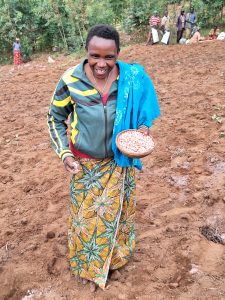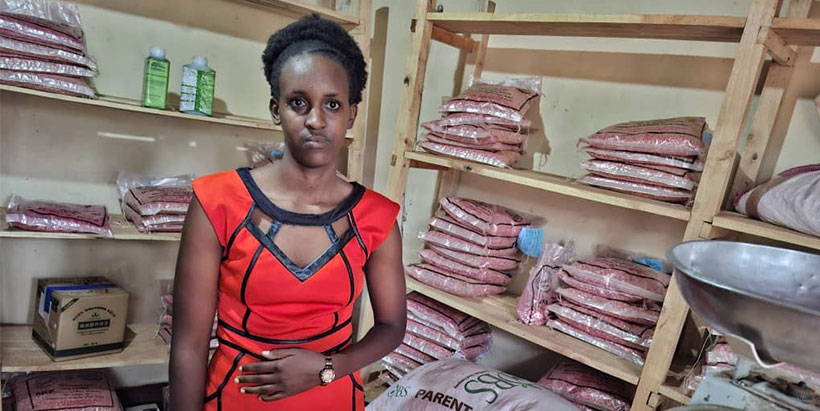13 December 2024
 January 2024: Excellent performance of ‘bazooka’ hybrid maize variety performance in a farmer’s field in Kirundo District, Burundi. World Vision International Burundi, SSG, and ISABU were on the ground to assess the results.
January 2024: Excellent performance of ‘bazooka’ hybrid maize variety performance in a farmer’s field in Kirundo District, Burundi. World Vision International Burundi, SSG, and ISABU were on the ground to assess the results.
Lack of quality seeds and difficulties getting essential agricultural inputs have been significant challenges for farmers across Burundi. The IITA–CGIAR led AID-I GLR project – known as the Kugwiza Project in Burundi – is addressing this critical need by not only equipping farmers with the knowledge to acquire high-quality seeds but also forging strong connections between farmers and local input suppliers so that quality seeds are available to farmers.
Consistent access to high-quality seeds and related inputs improves both productivity and profitability. By facilitating partnerships with local input suppliers, the project has created a reliable network to enhance timely access to essential agricultural inputs, going beyond quality seeds to cover other essential inputs such as fertilizer and lime.
In Kayanza Province, World Vision Burundi leads a consortium of scaling partners whose goal is to empower small-scale farmers through good agronomic practices and better crop varieties. Triphonie Hakizimana is one such farmer. At 43 and a mother of four, her livelihood has been positively transformed by the project.
World Vision Burundi has trained farmers on good agricultural practices to improve smallholder farming and livelihoods, including field preparation, fertilization with organic and mineral manure, line sowing, weeding, disease control, and seed preservation. This was coupled with access to certified, clean, high-yield seeds for common food crops such as beans, hybrid maize (bazooka), orange-fleshed sweet potatoes, livestock-improvement practices, and advisory services, including brochures explaining the inputs.
“This knowledge has been very beneficial because, in the past, we planted using disorganized methods,” says Triphonie.

Triphonie initially thought the 100-gram pack of bazooka hybrid maize seeds was a joke. But she couldn’t believe her eyes after the harvest—the yield had increased significantly. She went to an agro-dealer and bought more seeds (eight kilos) to plant on a larger plot for the next season.
She lives in Muhanga Commune, Kayanza Province, where families typically rely on farming and livestock-keeping as their economic mainstays. Initially skeptical when the project distributed only a small pack of hybrid maize seeds, she quickly recognized the benefits of certified, high-yielding seeds and the improved farming techniques accompanying the dissemination of the small-pack approach.
“When I received the 100 grams of seeds, I thought it was a joke. But after the harvest, I was truly surprised. It was a learning experience because I planted these seeds near my old plots and prepared both fields similarly, yet the yields were completely different,” Triphonie said.
The impact was significant in just one season (2024 A, October 2023–January 2024). The 100-gram seeds of bazooka hybrid maize on a 5 x 10-meter plot yielded 23 kilos, a marked difference from her previous yields of less than 150 kilos from a 50 x 50-meter plot. Her initial surprise blossomed into confidence as she observed the crop’s lush growth and climate resilience, withstanding disease and wind.
“Everyone who passed by my field asked questions about the plot planted with certified seeds,” she proudly recalls. “We are asking the Kugwiza Project to make more seeds available, as there will be high demand but not enough supply from the seed multipliers,” she cautions.
For the following cropping season, 2025 A (October 2024–January 2025), and inspired by her positive small-pack experience, Triphonie confidently purchased about eight kilos from an agro-dealer to plant on a larger 50 x 50-meter plot.
“We purchased the seeds from a seed shop in our commune,” Triphonie added.
To streamline, standardize, and systematize the availability of high-quality certified seeds and other inputs for smallholder farmers, the Kugwiza Project collaborated with agro-dealers. The project strengthened the capacity of the agro-dealers by connecting them with seed companies to ensure a steadfast and stable seed supply.
The connections have caught and now have traction. A local hybrid maize seed entrepreneur, Yvette Akimana, has seen a sharp rise in demand for certified and clean maize seeds, which not only yield more but also resist diseases and adverse climate effects.
 An agro-dealer since 2022, Yvette notes that “before the Kugwiza Project, seed demand was low. Now, farmers know the value of high-quality hybrid maize seeds, and our sales have grown season after season.”
An agro-dealer since 2022, Yvette notes that “before the Kugwiza Project, seed demand was low. Now, farmers know the value of high-quality hybrid maize seeds, and our sales have grown season after season.”
Her efforts have steadily increased the bazooka seed supply and corresponding acreage. With growing interest from local farmers, she’s expanding her stock to meet demand. Efforts like hers significantly contribute to improving the country’s agriculture and seed systems. These steadfast and expanding agro-dealer promote-and-supply efforts of hybrid maize seed, and the need-driven demonstrable farmer interest are both reflected in the quantities sold countrywide in three consecutive years (2022–2024) and seasons standing at 1.5, 3.2, and 5.6 tons, respectively.
For the upcoming 2025 A cropping season, farmers nationwide have already pre-ordered 8.6 tons of hybrid maize seeds, outstripping supply, “The quantities imported from NASECO were insufficient to meet the demand,” observed Yvette, the agro-dealer.
According to NASECO, demand has more than doubled this year, rising from 156 tons in 2023 to 377 tons in 2024. Yields increased from less than one ton per hectare to more than four tons in Burundi.
Currently, Burundi’s seed system still heavily relies on seed import, leaving supply and affordability susceptible to external forces. For example, Yvette imports seeds from Uganda’s NASECO company.
But the seed-supply future is promising. Local seed multipliers like Larissa Igiraneza are key in supplying high-quality seeds locally. Based in Muyinga, Larissa has worked with Institut des Sciences Agronomiques du Burundi (ISABU) since 2014 to produce certified seeds. With the Kugwiza Project’s support, she has doubled her fields to keep pace with local demand, recognizing that “certified seeds are strong, productive, and resistant.” Kugwiza has amplified her capacity through training and the small-pack approach, fostering the adoption of improved seed and agricultural growth in the community.
Larissa Igiraneza said;
“I will build greenhouses as soon as I get the bags to cover the nursery. Currently, I cannot meet the demand, so I am working to increase the harvest by cultivating on a larger scale. After the project explained to the community the importance of consuming orange-fleshed sweet potatoes, for example, and with the emergence of processing units that produce various products from sweet potatoes such as bread, chapatis, and cakes, many farmers are now requesting them. As a result, I had to expand my fields and have already purchased two hectares on another hill.
I have also already opened stores for certified seeds – especially hybrid maize and beans – in Gashoho and Gasorwe. There are model farmers [Village-Based Advisors] who are under the guidance of the Kugwiza Project and help us promote certified seeds in the Gashoho commune. I have just opened three seed shops in the Gasorwe commune to expand my market, whereas I have only worked in the Gashoho commune before.
Another strategy is to diversify the types of crop varieties in collaboration with certified seed producers, possibly with support from BPEAE [Bureau Provincial de l’Environnement, de l’Agriculture et de l’Elevage], responsible for providing agricultural technical assistance in Burundi]. I also plan to work with local microfinance institutions and have just applied for a loan to increase my working capital.
This project taught me how to raise community awareness of certified seeds by setting up small demonstration plots and sowing 100 grams of beans and maize in high-traffic areas. This made it much easier to promote these seeds [as farmers could see the results for themselves]. This is the approach I plan to use to compete with other seed multipliers.
The seed multiplication and sales sectors are very beneficial. I have registered at the national level, and ISABU has listed me as a certified seed multiplier recognized by ONCCS, Burundi’s national agency responsible for controlling and certifying seeds.
When the planting season arrives, farmers come to me for certified seeds. We have observed that these farmers are now a growing part of our client base: previously, we only had corporate customers, with organizations – especially NGOs – buying seeds to distribute to their target beneficiaries.
Farmers’ demand for bazooka hybrid maize was around 732 kilos during the planting season 2023B. After the Kugwiza intervention, the demand rose exponentially in seasons 2024A and B. More than 4,000 customers ordered nearly 5 tons, up from 2.6 tons previously sold to individual farmers.
I am very grateful to this project and its partners for providing the knowledge to help us now and in the future.”
The collaboration above exemplifies the Kugwiza Project’s model of bringing together farmers, distributors, and multipliers to create a self-sustaining ecosystem to distribute high-quality seeds.
With continued education and community outreach, AID-I GLR provides resources and empowers local businesses to carry these gains forward, creating enduring benefits for the region.